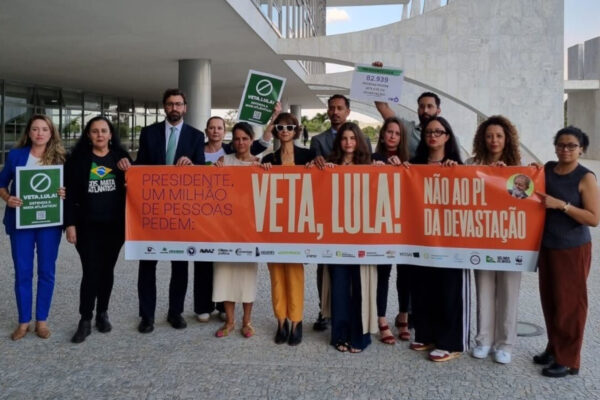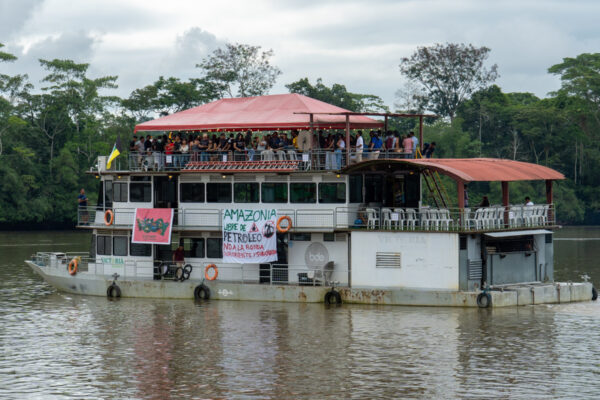Brazil’s Indigenous peoples have faced their most pivotal moment in the battle for territorial rights since the 1988 Constitution. Over the nearly 35 years since its enactment, countless legislative efforts in the National Congress, primarily driven by the agribusiness lobby, aimed to reshape and reduce these Indigenous rights.
Yesterday, September 21, 2023, was a historic day that marks the concluding chapter of a significant trial that sought to reaffirm what the Brazilian 1988 Constitution had already established: Indigenous peoples have inherent rights to their lands, rights that precede their recognition on the date. By a vote of 9 to 2, Brazil’s Supreme Court declared the Marco Temporal unconstitutional. This thesis asserted that only those lands occupied by Indigenous people at the time the 1988 Constitution was enacted could be demarcated, meaning only communities present in those areas on that date could lay claim to the land.
This perspective glaringly overlooked the fact that numerous Indigenous communities had been unjustly evicted and persecuted before 1988, and because of this, they were unable to remain on their land.
Direct from Brasília, Kleber Karipuna, executive coordinator of the Articulation of Indigenous Peoples of Brazil (APIB), stated: “We have defeated the Marco Temporal, and we’ve won this battle! It’s a joyous moment for all the Indigenous people. However, we will remain vigilant against other ongoing threats in Congress. There’s still a strong possibility that the agribusiness lobby might react in response to the Supreme Court’s decision. We will stay alert to ensure there is no rollback on our rights.”
“After many years of struggles, mobilizations, and anxieties, this outcome dictates Brazil’s future of Indigenous land demarcations. We shall indeed celebrate the strength of Brazil’s Indigenous peoples”, said Sonia Guajajara, the Minister of Indigenous Peoples, who is currently in New York, attending Climate Week.
In her statement, Justice Cármen Lúcia expressed that the Marco Temporal thesis contradicts fundamental rights and endangers Indigenous peoples’ and communities’ integrity and identity. “The Marco Temporal is not a defining criteria for recognizing traditionally occupied lands,” she said.
“In addition to representing a core battle over Indigenous fundamental rights, the Marco Temporal trial was our times’ most important climate dispute. For years now, this unconstitutional thesis has been hindering the protection of Indigenous lands, contributing to violence against Indigenous defenders, to the degradation of ecosystems, to deforestation, and to greenhouse gas emissions. This victory is a clear demonstration that the Indigenous movement is ready to defend not only their territorial rights but also the integrity of the Brazilian constitution and of the global climate balance”, said Ana Carolina Alfinito, Amazon Watch Legal Advisor.
Though the justices formed a majority against the Marco Temporal thesis, they held differing views on other prominent matters raised during the trial. Justice Toffoli’s vote raised concern among Indigenous peoples and human rights advocates. While Toffoli did not recognize the Marco Temporal, he opened up a complex and unsettling debate around mining within Indigenous territories, seeking to set out a regulatory regime for these activities. This topic was not part of the trial. According to the Brazilian Federal Constitution, all mining in Indigenous lands is forbidden until the National Congress enacts specific regulations on the topic.
These debates will continue in next week’s sessions when the Supreme Court will establish its final ruling on the matters pertaining to Indigenous land rights that were brought up during the trial.
The Supreme Court’s determination of the unconstitutionality of the Marco Temporal should ideally halt the Senate’s review of Bill 2903. Should the Senate proceed with and potentially approve this bill as currently presented, it would undeniably clash with the Supreme Court’s decision and thus warrant legal challenge. It would be imperative to file a case highlighting its unconstitutionality before the Supreme Court, which would likely lead to the bill’s annulment.













